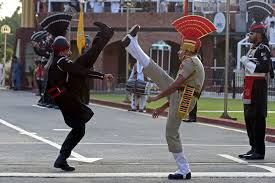Partition of India came in 1947. It is 78 long years since and the debate about two religious communities in one nation is not settled still. Instead, in 1971 we had the third nation born. Yet the blood and mutual hatred continue to flow in South Asia.
The poetic line 'Sooni padi hui hae Muddat se Dil ki basti ....(The land of my heart is left alone ... deserted for a very long time)" -- was penned by poet Allama Muhammad Iqbal, often referred to as Allama Iqbal.
In the neighbourhood, people would hail him as the Spiritual Father of Pakistan.
 |
| Patriotism at borders - Wagah |
It was one of the tragic chapters in human history that of all the protagonists it was left to Iqbal -- by coincidence, fate and design -- that the first seed of partition of India was sown. On Dec 29, 1930 at Allahabad - he first mooted the idea of Pakistan. It may be hard to believe that the poetic genius had his DNA in a Hindu family of Kashmiri pandits and it he was who also wrote:
"Saarey jahan se achha ... Hindustan hamara".
It is argued that Iqbal was irked when he saw the solidarity of Jews crumble under Christian Europe. He was worried that the same fate would greet Muslims in united India after the Britishers left.
His worst fear was if Muslims sacrificed their own culture at the 'altar of Indian nationhood'; slowly they would be absorbed and made extinct.
The same man had also written "Apno se bair rakhna Tu ne Buton se sikha; jung o jidai sikhaya waiz ko bhi Khuda ne (We learnt to be in dispute with own people from Gods...We learnt belligerence and wars also from God and religious books)".
But what he said and what he did were different. His 1930 discourse change the course of Asian history. It is argued that Iqbal was misled by a section of Muslim intellectuals and even the Britishers to take such a line at the Allahabad meet of the Muslim League.
However, some others say B S Moonjee - Balakrishna Shivram Moonje (12 December 1872 – 3 March 1948) was also responsible in some indirect ways. Moonjee, a leader of the Hindu Mahasabha, reportedly had gone to Italy and had met fascist leader Mussolini. In tune with what was turning out, M S Golwalkar in his book 'We of the Nationhhod defined' had actually applauded Hitler.
"To keep up the purity of the Race and its culture, Germany shocked the world by her purging the country of the Semitic races - the Jews".
However, there is yet another twist in the tale. Muhammad Ali Jinnah, who midwifed Pakistan in 1947 - nine years after Iqbal expired - was ambiguous about the socio-political characteristic of Pakistan as a nation. Jinnah arguably did not want the new nation Pakistan to be ruled according tothe Caliphs of Islam.
Nevertheless, in the words of Jinnah's personal aide Sarifuddin Pirzada -- "... At the same time Jinnah was very careful not to make a commitment one way or the other so that Muslims would not be alienated".
Jinnah was a Gujarati and hailed from Mumbai (then Bombay). At later stages, Pakistan passed onto the hands of radical Punjabi Muslim elites and - the rest is history.
Iqbal's grandfather was an eighth cousin of Sir Tej Bahadur Sapru, an important lawyer and freedom fighter. Iqbal often mentioned and commemorated his Kashmiri lineage in his writings.
Pirzada was also firm. "Jinnah was against theocracy. This is what matters". He also waxed eloquently --
"An Islamic state can be a fully modern state, unless you say it should be ruled by a theocracy".
Soldiers of Misfortune - Collective wounds
Pakistan’s political and economic crises in 2025 are inter connected. While the political upheaval and regime change - ouster of Imran Khan - have not directly caused the economic turmoil, they have certainly exacerbated it.
The creditors are convinced as much as rival India or neo-patron Donald Trump that Pakistan is essentially a non-serious and irresponsible polity.
As the economy and diplomacy and its military policies teeter on the brink of collapse, Pakistan continues to hurtle toward an uncertain future.
Sadly, at such a juncture, it is governed by a Field Marshal, who got himself promoted after loosing a war. The elites are simply not bothered or are still unable to grasp the enormity of the challenges facing the country.
People are clueless but silent with a near slavish mindset. The feudalism has survived. As so-called power politics pendulum swings; people know their governance and democratic system are inherently unstable.
The folk wisdom prevails and it is that an India-bashing 'benevolent dictator' can lead a country to its full potential better. No wonder the present military leadership has again started courting Washington.
This is a country where governments have ended with the loss of half the country in a genocidal civil war (1971), a mysterious plane crash killing the president (1988), midnight coups, daytime coups, and backroom deal-making among factionalized elites.
This list connotes many things, but orderliness is not one of them, says an article in journalofdemocracy.org.
ends









No comments:
Post a Comment